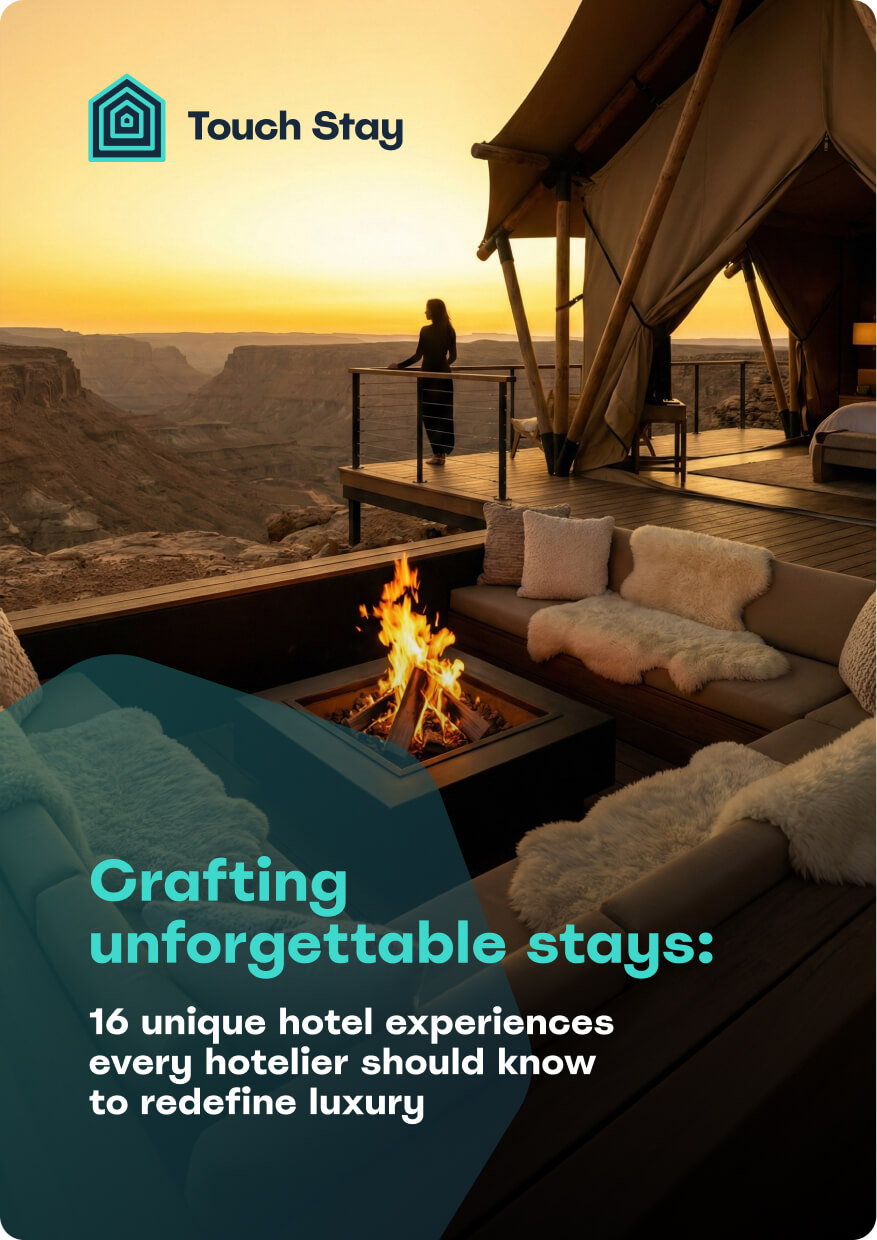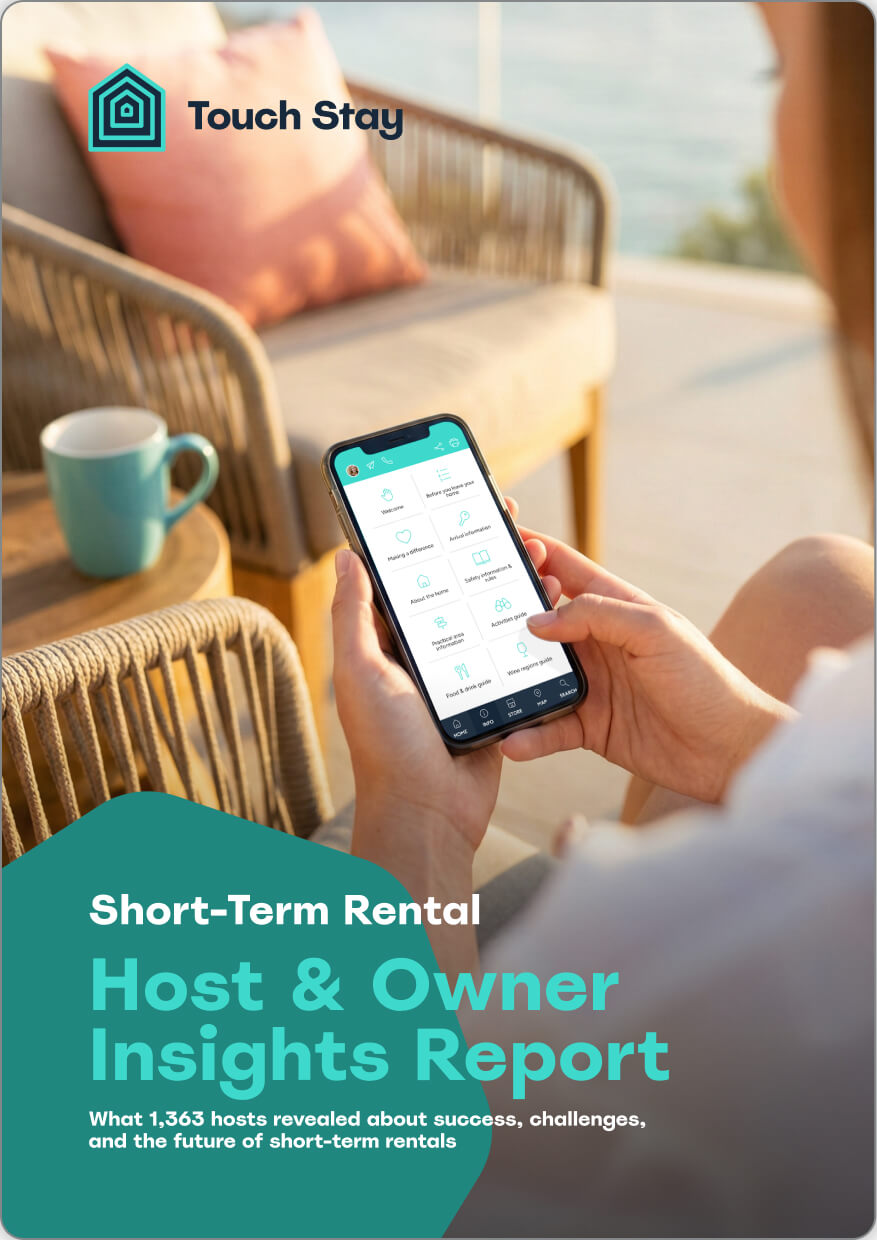Navigating the short-term rental market on platforms like Airbnb can be rewarding yet demanding. For property owners seeking to maximise returns without the daily operational burden, an Airbnb management company offers a valuable solution. This comprehensive guide for 2025 will cover everything you need to know, from their core functions and importance to costs and selection, empowering you to make informed decisions.
- What is Airbnb property management?
- Why is Airbnb property management important?
- Pros and cons of using an Airbnb management company
- What does an Airbnb property manager actually do?
- How to become an Airbnb property manager
- How much does Airbnb management cost?
- How to choose an Airbnb management company (tips and tricks)
- 10 of the best Airbnb management companies
- How to manage Airbnb properties without a management company
- Frequently asked questions
Want to streamline your Airbnb operations? Try Touch Stay for free!
Drop your Airbnb link to get started.
Get your custom guest guide in 60 seconds. No card required.
What is Airbnb property management?
Airbnb property management involves the professional oversight of short-term rental properties listed on platforms like Airbnb. These companies act as intermediaries, handling daily operations to ensure a seamless and profitable experience for property owners. They exist to relieve owners of the time and effort required for successful Airbnb management.
Airbnb property managers typically handle:
- Listing creation and management
- Guest communication and booking management
- Dynamic pricing strategies
- Cleaning and maintenance coordination
- Guest check-in/check-out
- Guest support
- Compliance with local regulations
This service is crucial as effective Airbnb management demands considerable time and expertise, which many owners find challenging to provide themselves.
Why is Airbnb property management important?
Airbnb property management is significant for hosts seeking passive income and reduced stress, investors aiming to scale operations efficiently, and guests desiring a consistently positive experience. For hosts, it frees up time while ensuring their investment is optimised. Investors can manage multiple properties effectively, and professional management leads to improved guest satisfaction, better reviews, and increased bookings, vital in a competitive market.
Pro tip: check out our step-by-step guide on how to launch an Airbnb business without owning property
Pros and cons of using an Airbnb management company
Deciding on an Airbnb management company requires weighing the advantages and disadvantages:
Pros
Saves a lot of time
- Management companies handle time-consuming tasks like bookings, communication, cleaning, and maintenance, freeing up the owner's time.
Better guest experience
- Professionals ensure smooth check-ins, prompt communication, and efficient handling of guest needs, leading to higher satisfaction and better reviews.
Increased number of bookings
- Expertise in listing optimisation, pricing strategies, and marketing can lead to higher occupancy rates and revenue.
Easier compliance with laws and regulations
- Management companies stay updated on local rules, ensuring your property adheres to all necessary regulations.
Improved condition and upkeep of rental properties
- Regular professional cleaning and maintenance coordination help preserve the property's condition and prevent costly repairs.
Cons
It’s expensive
- Management fees, usually a percentage of booking revenue, can reduce profits.
Less control over your properties
- Owners relinquish some control over daily operations and decisions.
Sometimes risky or inconsistent results
- The quality of management companies varies, so thorough vetting is essential to avoid poor service.
What does an Airbnb property manager actually do?
An Airbnb property manager undertakes a range of responsibilities to maximise property performance and guest satisfaction:
Create and optimise listings
- Crafting compelling descriptions, using high-quality photos, and optimising listings for search and Airbnb algorithms.
Online marketing and social media
- Extending marketing efforts beyond Airbnb through social media and other platforms.
Adjust pricing strategy and manage revenue
- Implementing dynamic pricing based on market conditions to maximise income.
Handle guest communication and turnovers
- Managing all guest interactions and coordinating seamless check-ins and check-outs.
Coordinate cleaning and maintenance
- Arranging professional cleaning and handling routine repairs.
Provide guest support
- Serving as the primary contact for guests, addressing issues and providing assistance.
Ensure compliance with local laws and regulations
- Keeping abreast of and adhering to local short-term rental rules and tax requirements.
Manage guest reviews
- Encouraging and responding to guest feedback to maintain a positive online reputation.
Collect taxes
- Often handling the collection and remittance of local occupancy taxes.
Protect against property damage
- Implementing measures like security deposits or damage protection insurance.
Report to property owners regularly
- Providing detailed reports on occupancy, revenue, and expenses.
How to become an Airbnb property manager
Becoming an Airbnb property manager suits those with strong organisational, communication, and problem-solving skills, along with market knowledge.
1. Gain relevant experience and skills
- Experience in hospitality, property management, or customer service is beneficial. Understand the Airbnb platform.
2. Build a strong network
- Connect with property owners and industry professionals.
3. Find clients and co-hosting opportunities
- Start with friends/family or explore co-hosting to gain experience.
- Tips: Network at real estate groups, connect with local hosts online, advertise locally.
4. Negotiate with homeowners to hire you
- Highlight your value in saving time, increasing revenue, and improving guest experience.
5. Determine your fees
- Research local rates (typically 15-25% of revenue) and decide on your pricing model.
Pro tip: learn more about Airbnb pricing strategies with our comprehensive guide to maximising your short-term rental revenue
6. Create a business plan
- Outline your services, target market, pricing, and financial projections.
New to Airbnb hosting? Check out our full guide on how to start an Airbnb business
7. Understand local laws and regulations
- Research all relevant short-term rental rules and tax obligations.
8. Automate your tasks with vacation rental software
- Use software to streamline bookings, communication, and pricing. This saves time and reduces errors.
Pro tip: learn more about Airbnb automation: 10 proven tips to streamline your vacation rental business
9. Start building your portfolio
- Showcase successes and testimonials to attract new clients.
10. Use Airbnb welcome books
- Implement digital welcome books like Touch Stay for essential guest information, enhancing their stay and reducing your workload.
Create your digital guidebook today!
How much does Airbnb management cost?
The cost of Airbnb management varies based on location and services.
Airbnb management fees explained
- Typically a percentage of gross rental income (e.g., 20% of £5,000 = £1,000 fee). This covers core management services.
Half-service vs. full-service Airbnb management costs
- Half-service (10-15%): Listing management, pricing, communication (owner handles cleaning/maintenance).
- Full-service (15-25%+): Comprehensive management including cleaning and maintenance.
How Airbnb management fees are calculated
- Commission-based: Percentage of booking revenue.
- Flat rate: Fixed monthly fee.
- Hybrid: Base fee plus a smaller percentage.
Additional costs in Airbnb management
- Setup fees, cleaning fees, maintenance markups, marketing costs, software fees, late check-in/out fees.
For more details, see: Property management fees breakdown & guide
How to choose an Airbnb management company (tips and tricks)
Selecting the right Airbnb management company is vital.
Look for experienced local Airbnb rental companies
- Local expertise in market dynamics and regulations is crucial.
Check their services and fee structures
- Ensure they offer the services you need at a transparent and competitive price.
Read reviews and testimonials
- Look for consistent feedback on communication and results.
Ask for referrals
- Speak to current or past clients for firsthand experiences.
Check credentials and licenses
- Verify necessary legal permissions to operate.
Schedule a consultation
- Discuss your property and their approach in detail.
Ensure clear communication and reporting
- Establish expectations for updates and communication methods.
Negotiate the best price
- Research local averages and be prepared to negotiate, especially with multiple properties or longer contracts.
10 of the best Airbnb management companies
| Company name | Location(s) | Services | Unique features | Pain points solved |
| Vacasa | USA, Canada, Mexico | Full-service management, marketing, guest communication, cleaning, maintenance | Technology-drive approach, dynamic pricing, wide geographic coverage | Time-consuming tasks, scaling operations, reaching a broad guest base |
| Evolve | USA | Listing creation, marketing, booking management, guest support | Performance guarantee, lower commission rates compared to full-service | Marketing reach, booking management, cost-conscious owners |
| AvantStay | USA | Full-service management for premium properties, design, tech integration | Focus on luxury rentals, in-house design services, smart home tech integration | Managing high-end properties, enhancing guest experience with technology and design |
| TurnKey Vacation Rentals | USA | Full-service management, smart home technology, local teams | Smart lock technology for seamless check-in, local teams for on-the-ground support | Security, efficient check-in, local expertise |
| Pacaso | USA | Manages shared ownership of luxury second homes | Fractional ownership model, handles all management aspects for co-owners | High costs of sole ownership, hassle of managing a second home |
| GuestReady | UK, France, Portugal, Spain, Italy, Malaysia | Full-service management, cleaning, maintenance, guest communication | Focus on professional cleaning and maintenance, multi-lingual guest support | Ensuring high cleanliness standards, communicating with international guests |
| Plum Guide | UK, Europe, USA | Selects and manages only top-tier vacation rentals | Rigorous property selection process, targets discerning travellers | Attracting high-quality guests, maintaining exceptional property standards |
| ALTIDO | UK, Italy, Portugal | Full-service management, interior design, property setup | Emphasis on creating stylish and guest-friendly interiors, property setup services | Maximising rental appeal through design, hassle-free property preparation |
| Lovento | Spain | Full-service management, legal compliance, tax handling | Strong focus on navigating local regulations and tax requirements | Legal complexities of short-term rentals in Spain |
| City Relay | UK (London) | Full-service management, concierge services, 24/7 guest support | Specialised in the London market, offers concierge services for guests | Managing properties in a busy urban environment, providing premium guest services |
Please note that this is not an exhaustive list and the ‘best’ company will depend on your individual needs and property location.
How to manage Airbnb properties without a management company
Self-managing your Airbnb requires effort but can save on fees.
- Use property management software for automation.
- Establish reliable cleaning and maintenance.
- Create clear house rules and welcome guides (consider Touch Stay).
- Employ dynamic pricing tools
- Be highly responsive to guests
- Ensure smooth check-in/out
- Manage guest reviews
- Understand local regulations and taxes
- Use high-quality photos
- Market your property effectively
Ready to enhance the guest experience and start reclaiming your precious time? Create your digital guidebook in minutes!
Frequently asked questions
No, Airbnb does not directly offer comprehensive property management services. They provide a platform for hosts to list their properties and connect with guests, along with some tools for managing bookings and communication. However, the day-to-day management of the property, such as cleaning, maintenance, and guest support, is the responsibility of the host or a hired property management company.
Whether you need a property manager for your Airbnb depends on your individual circumstances. If you live close to your property, have ample time, and enjoy managing the various aspects of hosting, you may not need one. However, if you live far away, have multiple properties, a busy schedule, or prefer a more hands-off approach, a property manager can be a valuable asset, saving you time and potentially increasing your profitability.
The value of Airbnb management fees depends on several factors, including the cost of the fees, the services provided, and the potential increase in revenue and guest satisfaction they can help you achieve. For many owners, the time saved, reduced stress, and potentially higher booking rates outweigh the cost of the fees. However, it's essential to carefully evaluate the services offered and the track record of the management company to ensure it's a worthwhile investment for your specific situation.
An Airbnb co-host typically assists a host with specific tasks related to their listing, such as managing the calendar, communicating with guests, or handling check-ins. They usually work under the direction of the primary host and their responsibilities are often more limited than those of a full-service property manager. A property manager, on the other hand, takes on comprehensive responsibility for the day-to-day operations of the rental property, often acting as the primary point of contact for guests and handling all aspects of management.
The earning potential for Airbnb property managers varies depending on factors such as the number of properties they manage, their fee structure, and their location. Those working for established management companies may earn a salary plus commission or bonuses. Independent property managers' income is directly tied to the revenue generated by the properties they manage and the fees they charge. Successful property managers can build a substantial income as they grow their portfolio of managed properties.
The requirement for a real estate license to manage Airbnb properties varies by jurisdiction. In some areas, managing short-term rentals falls under the umbrella of property management and may require a real estate license. It's crucial to research the specific laws and regulations in your local area to ensure you are operating legally.
While specific qualifications can vary by location, successful Airbnb property managers typically possess a combination of skills and experience. These often include strong communication and interpersonal skills, excellent organisational and time-management abilities, problem-solving skills, a good understanding of the local short-term rental market, and knowledge of relevant laws and regulations. Experience in hospitality, customer service, or property management is highly beneficial. While a real estate license may be required in some areas, a strong understanding of the Airbnb platform and best practices for hosting is universally important.

Ned
Ned has clocked up over 11 years in digital marketing and comms, with a strong focus on creating engaging content for a range of brands and agencies. When he’s not writing, he can be found digging for records, peering through his telescope at the night sky, or onboard his local lifeboat where he volunteers as a crewmember.
Be the first to know!
Join our newsletter for early access to:
- ✅ Free guides
- ✅ Pro tips & tricks
- ✅ Time saving tutorials
- ✅ Latest blog posts
- ✅ Checklists & templates






















